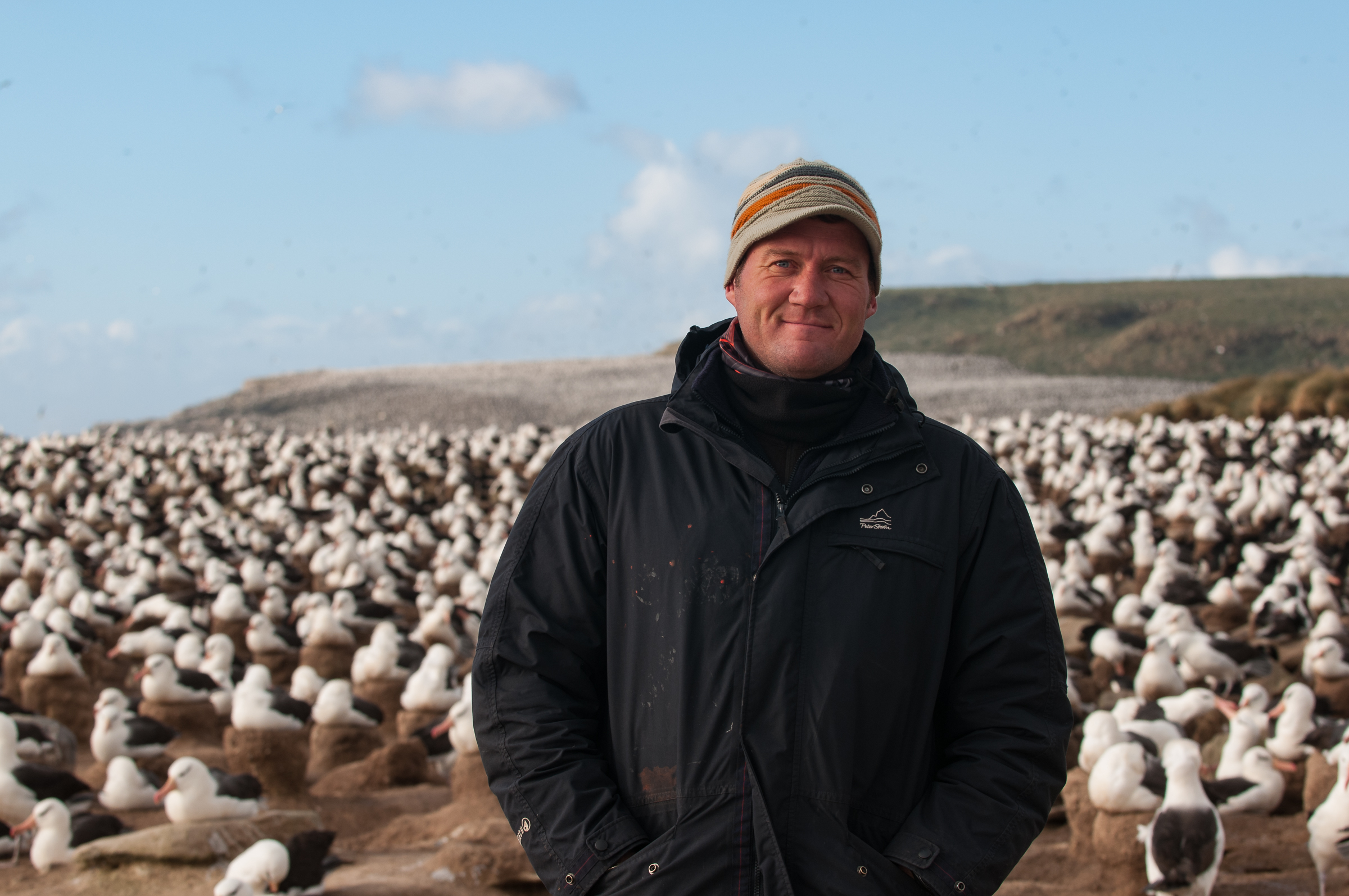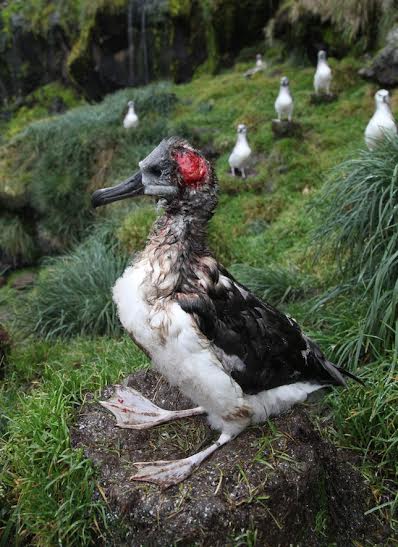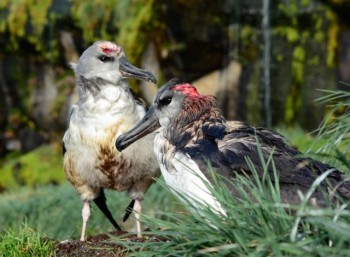
Anton Wolfaardt with the huge Black-browed Albatross colony on Beauchêne Island, South Atlantic, photograph by Leigh Wolfaardt
South Africa’s sub-Antarctic Marion Island is overrun by introduced House Mice Mus musculus, which in the last two decades have taken to attacking and killing the island’s albatrosses and petrels, notably chicks of the globally threatened Grey-headed Thalassarche chrysostoma, Sooty Phoebetria fusca and Wandering Diomedea exulans Albatrosses (click here for previous ACAP Latest News posts on Marion’s mice).
Mice are eating Marion Island's seabirds: a BirdLife South Africa video
The Mouse Free Marion Project is a joint endeavour between the South African Department of Environment, Forestry and Fisheries (DEFF) and the environmental NGO BirdLife South Africa. A separate entity, the Mouse-Free Marion NPC, has been set up to undertake this important work. Following a feasibility study in 2013 by New Zealand island restoration expert John Parkes it currently aims to eradicate the mice in 2023. Last year a call was made for “a highly qualified, dedicated and dynamic” Project Manager to review and refine the Mouse-Free Marion Project and its operational plans and assist with the appointment of the Operations Manager and the eradication team.


Mice attack and kill Grey-headed Albatross chicks on Marion Island, photographs by Ben Dilley and the FitzPatrick Institute
ACAP Latest News is now pleased to report that as of the beginning of the month the appointed MFM Project Manager is South African Anton Wolfaardt, well known to the ACAP community as Co-convenor of its Seabird Working Group (although a position from which he will now stand down to concentrate on the Marion mice).
After spending a year on Marion Island in 1994/95 monitoring its seabirds, Anton completed his PhD at the University of Cape Town (UCT) in 2007 on the impact of oil pollution on the breeding ecology of the now Endangered African Penguin Spheniscus demersus. He then spent five years in the Falkland Islands (Islas Malvinas)* working for the United Kingdom’s Joint Nature Conservation Committee as the ACAP Coordinator for the South Atlantic including the Falkland Islands, South Georgia and South Sandwich Islands (Islas Georgias del Sur y Islas Sandwich del Sur)*, the Tristan da Cunha -Gough Islands and the UK’s interests in Antarctica. In recent years Anton has worked as a freelance environmental consultant, as well as as acting as a lecturer and guide on expedition ships to the Antarctic and sub-Antarctic regions during austral summers, along with running a small farm in South Africa’s Eastern Cape with his wife Leigh Wolfaardt – also well known to ACAP for her albatross artwork.
The attempt to eradicate Marion Island’s mice in two years’ time follows on from this year’s attempt to eradicate the House Mice of Gough Island which are also attacking the island’s birdlife by the UK’s Gough Island Restoration Project (GIRP) – as regularly reported by ACAP Latest News. South Africa, which operates a weather station on Gough, is working closely with GIRP, lending logistic support with transport to and accommodation on the island. It is envisaged that the ensuing transfer of skills and the donation of equipment will be a major boost to the Marion Island exercise.
Another UCT graduate, Peter Ryan, Director of the FitzPatrick Institute of African Ornithology at the same university, is a member of the Mouse Free Marion Management Committee. He also Chairs the recently established MFM Scientific and Technical Advisory Group (STAG) which will offer scientific and technical guidance to the management committee as and when required. The ACAP Information Officer has accepted a request to serve on the STAG. He looks forward to helping his old colleagues Anton and Peter in helping work towards a mouse-free Marion Island in 2023.
Taking its cue from the successful eradication of mice on New Zealand’s (and far smaller at 21 km²) Antipodes Island by the Million Dollar Mouse project, BirdLife South Africa has been running a ‘Sponsor a Hectare’ campaign to raise funds for the many tonnes of poisoned cereal bait that will be required. So far 1741 hectares (with a donation of South African Rands 1000 (or USD 90) per hectare) have been sponsored by 657 supporters. With only 5.73% of the island’s 290 km² funded so far there is a long way to go so your own donation will still be welcomed!
Reference:
Parkes, J. 2014. Eradication of House Mice Mus musculus from Marion Island: a Review of Feasibility, Constraints and Risks. BirdLife South Africa Occasional Report Series No. 1. Johannesburg: BirdLife South Africa. 27 pp.
With thanks to Peter Ryan and Anton Wolfaardt.
John Cooper, ACAP Information Officer, 02 February 2021, reposted 10 February 2021
*A dispute exists between the Governments of Argentina and the United Kingdom of Great Britain and Northern Ireland concerning sovereignty over the Falkland Islands (Islas Malvinas), South Georgia and the South Sandwich Islands (Islas Georgias del Sur y Islas Sandwich del Sur) and the surrounding maritime areas.

 English
English  Français
Français  Español
Español